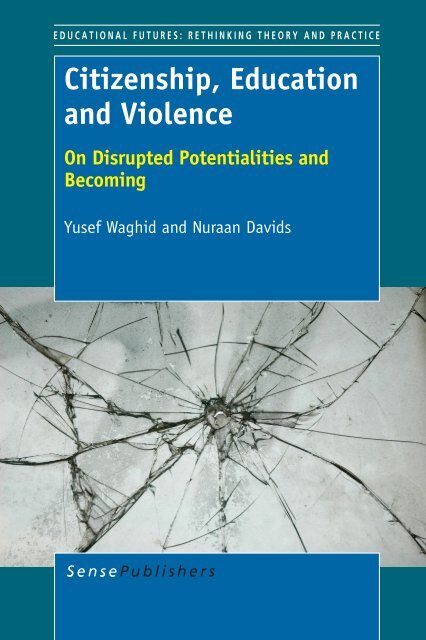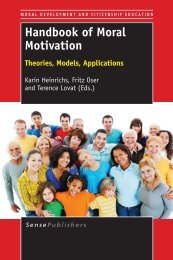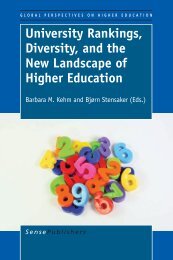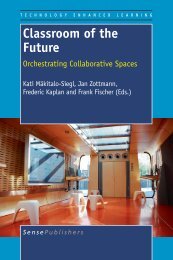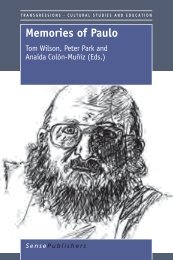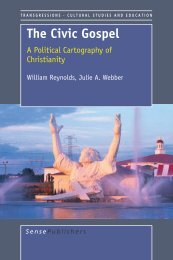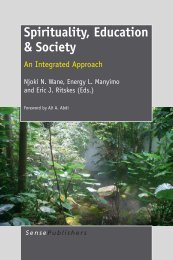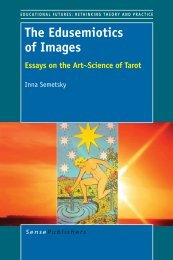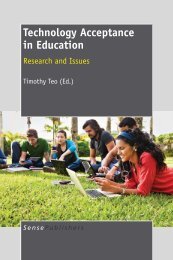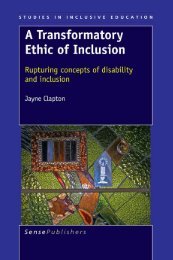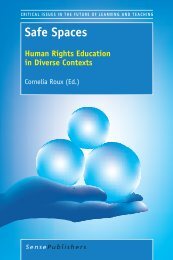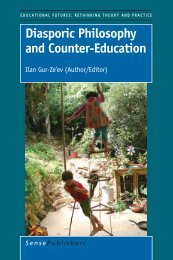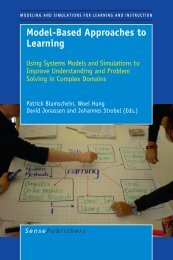Citizenship, Education and Violence - Sense Publishers
Citizenship, Education and Violence - Sense Publishers
Citizenship, Education and Violence - Sense Publishers
Create successful ePaper yourself
Turn your PDF publications into a flip-book with our unique Google optimized e-Paper software.
<strong>Citizenship</strong>, <strong>Education</strong> <strong>and</strong> <strong>Violence</strong>
EDUCATIONAL FUTURESRETHINKING THEORY AND PRACTICEVolume 62Series EditorMichael A. PetersUniversity of Waikato, New Zeal<strong>and</strong>Editorial BoardMichael Apple, University of Wisconsin-Madison, USAMiriam David, Institute of <strong>Education</strong>, London University, UKCushla Kapitzke, Queensl<strong>and</strong> University of Technology, AustraliaSimon Marginson, University of Melbourne, AustraliaMark Olssen, University of Surrey, UKFazal Rizvi, University of Illinois at Urbana-Champaign, USALinda Tuahwai Smith, University of Waikato, New Zeal<strong>and</strong>Susan Robertson, University of Bristol, UKScopeThis series maps the emergent field of educational futures. It will commissionbooks on the futures of education in relation to the question of globalisation <strong>and</strong>knowledge economy. It seeks authors who can demonstrate their underst<strong>and</strong>ing ofdiscourses of the knowledge <strong>and</strong> learning economies. It aspires to build aconsistent approach to educational futures in terms of traditional methods,including scenario planning <strong>and</strong> foresight, as well as imaginative narratives, <strong>and</strong> itwill examine examples of futures research in education, pedagogical experiments,new utopian thinking, <strong>and</strong> educational policy futures with a strong accent on actualpolicies <strong>and</strong> examples.
<strong>Citizenship</strong>, <strong>Education</strong> <strong>and</strong> <strong>Violence</strong>On Disrupted Potentialities <strong>and</strong> BecomingYusef WaghidNuraan DavidsFaculty of <strong>Education</strong>, Stellenbosch University, South Africa
A C.I.P. record for this book is available from the Library of Congress.ISBN: 978-94-6209-474-1 (paperback)ISBN: 978-94-6209-475-8 (hardback)ISBN: 978-94-6209-476-5 (e-book)Published by: <strong>Sense</strong> <strong>Publishers</strong>,P.O. Box 21858,3001 AW Rotterdam,The Netherl<strong>and</strong>shttps://www.sensepublishers.com/Printed on acid-free paperAll Rights Reserved © 2013 <strong>Sense</strong> <strong>Publishers</strong>No part of this work may be reproduced, stored in a retrieval system, or transmittedin any form or by any means, electronic, mechanical, photocopying, microfilming,recording or otherwise, without written permission from the Publisher, with theexception of any material supplied specifically for the purpose of being entered <strong>and</strong>executed on a computer system, for exclusive use by the purchaser of the work.
TABLE OF CONTENTSForewordPrefaceAcknowledgementsAbout the Authorsviixixvxvii1. Current Liberal Underst<strong>and</strong>ings of <strong>Citizenship</strong> <strong>Education</strong>: <strong>Citizenship</strong><strong>Education</strong> as a Deliberative, Compassionate <strong>and</strong> Responsible Encounterwith the Other 12 Rethinking <strong>Citizenship</strong> <strong>Education</strong> as a Pedagogical Encounter:On Becoming an Equal, Intelligible, Amateur Citizen 93 On Potentiality in Schools: Cultivating a <strong>Citizenship</strong> <strong>Education</strong>of Becoming 214 On the Potentiality <strong>and</strong> Impotentiality of <strong>Violence</strong> 335 On Conflict <strong>and</strong> <strong>Violence</strong> in Schools 456 A Case Study on Cultivating <strong>Citizenship</strong> <strong>Education</strong> in Schools:An Empirical Initiative in Becoming 557 On the (Im)possibility of Building a Culture of Humanity<strong>and</strong> Responsibility in Schools: The South African Exampleof School <strong>Violence</strong> 678 Disrupting <strong>Violence</strong> in Schools: Establishing Potentially BecomingSchools for <strong>Citizenship</strong> <strong>Education</strong> 79Postscript: Reconsidering <strong>Education</strong>al Leadership as Commensuratewith Potentiality <strong>and</strong> Becoming 89Appendix: Re-Imagining <strong>Citizenship</strong> <strong>Education</strong> Manual 103References 119Index 125v
FOREWORDIn the ABC Boyer Lectures that he delivered in 1997 Between Fear <strong>and</strong> Hope:Hybrid Thoughts on Public Values (1) Martin Krygier undertook a sustained analysis<strong>and</strong> exploration of the values that combined to define <strong>and</strong> constitute a decent formof life in today’s participative democracy. Included among the values that he sawas a figuring between fear <strong>and</strong> hope in shaping <strong>and</strong> characterising our democracytoday, he discerned the following as key: law <strong>and</strong> government, tolerance, civility,responsibility, individual <strong>and</strong> community, survival <strong>and</strong> flourishing, freedom <strong>and</strong>restraint, nationalism <strong>and</strong> ethics, pride, shame <strong>and</strong> decency. He concluded that, inthe ethics of our modern democracy, there is “room for them all <strong>and</strong> an importantplace for each”.Around that time, Judith Chapman, Izak Froumin <strong>and</strong> others had worked with meto put together a collection of essays addressing the theme Creating <strong>and</strong> Managingthe Democratic School (2). We tried to discern <strong>and</strong> explore some of the values listedamong the norms <strong>and</strong> conventions of citizenship to be preferred, promulgated <strong>and</strong>practised in the new forms of democracy that were being promoted as key activitiesin educating institutions of this form of society. We attempted to define <strong>and</strong> delineatewhat we saw as shared <strong>and</strong> separate key features of the form of polity enjoyed bycitizens in the well-established democracy of Australia <strong>and</strong> the then newly adopted<strong>and</strong> still developing democracy of Russia. We concluded that schools shouldhave a clear commitment to the values <strong>and</strong> principles embodied in a philosophyof democratic citizenship as well as to its practices <strong>and</strong> procedures; <strong>and</strong> that theextension, communication <strong>and</strong> evaluation of public knowledge, together with acommitment to the increase of public welfare <strong>and</strong> of individual an social justice areamong the prime values in education <strong>and</strong> democracy.Now further increments of insight <strong>and</strong> underst<strong>and</strong>ing have been provided byYusef Waghid <strong>and</strong> Nuraan Davids, who have taken inspiration from the adoption of anew form of citizenship in South Africa since 1994 <strong>and</strong> have argued that some recentdevelopments in democracy impacting on the lives of citizens call for serious review<strong>and</strong> re-appraisal. One such feature that finds place in it, is the growth <strong>and</strong> appearanceof forms of violence that threaten or militate against democracy’s positive elements<strong>and</strong>, in some of its forms, inhibit the lives <strong>and</strong> sense of community, confidence <strong>and</strong>self-esteem of its citizens. In this work Waghid <strong>and</strong> Davids utter a Cri de Coeur forthe attention <strong>and</strong> consideration of policy-makers, educators <strong>and</strong> teachers working topromote a new model of education for citizenship, one that seeks to exp<strong>and</strong> uponthe current economistic concern for the cognitive in many education systems <strong>and</strong>schools, <strong>and</strong> elaborates <strong>and</strong> extends it into the realm of the social <strong>and</strong> the political.They are concerned to draw our attention to the inimical effects of the power <strong>and</strong>presence of all forms of violence on the function <strong>and</strong> direction of our educatingagencies.vii
FOREWORDIn this bold <strong>and</strong> important work Waghid <strong>and</strong> Davids are concerned to propose,explore <strong>and</strong> proffer a series of novel <strong>and</strong> thought-provoking contributions to the currentdebate about the nature, values <strong>and</strong> purposes of citizenship education <strong>and</strong> much of itscurrent aims, emphases <strong>and</strong> orientations, with particular light thrown on its capacityto address <strong>and</strong> attack the intrusion <strong>and</strong> ill effects of the manifestation <strong>and</strong> forms ofviolence that we see in many parts of our societies <strong>and</strong> that affect adversely the workof our schools <strong>and</strong> educating institutions. They propose a set of approaches, initiatives<strong>and</strong> models for altering <strong>and</strong> redirecting much of the orientation of citizenship educationin what they see as its potential for improving the gains of learners in life-alteringdirections. In this work Waghid <strong>and</strong> Davids have put forward for their readers:-• An explanation of how education – from school to university – in any modern stateis in dire need of a re-orientation of those functions of its educating institutionsconcerned with the education of its future citizens. Their work has the potential tomake a substantial contribution to the ideals <strong>and</strong> activities of citizenship education.• It does so by making a serious <strong>and</strong> sustained contribution to the extension ofthinking on this theme <strong>and</strong> thus to extending the reaches <strong>and</strong> potential applicationsof new work in the philosophy of education.• It argues powerfully <strong>and</strong> convincingly in its endeavour to counteract <strong>and</strong> diminishthe role currently played by the presence <strong>and</strong> effects of violence of all kinds in anation’s schools• It offers an informed investigation of the implications of the approaches <strong>and</strong>utility of citizenship education for supporting <strong>and</strong> advancing the imperatives ofuniversity courses in teacher education <strong>and</strong> classroom training practice.• It develops a cogent <strong>and</strong> passionate critique of recent thinking in the critical fieldof citizenship education as a manifestation of the very best of thinking <strong>and</strong> writingin the philosophy of education worthy of adoption <strong>and</strong> adaptation in contemporaryeducational provision• It provides an extended analysis <strong>and</strong> justification of the enhancement of moral,social <strong>and</strong> political values <strong>and</strong> processes emerging from educational theory <strong>and</strong>practice covering all aspects of the organisation, governance <strong>and</strong> applicationof citizenry learning as key parts of the nature, aims <strong>and</strong> purposes of educatinginstitutions, both formal <strong>and</strong> informal, contributing to the formation of citizenshipin a participative democracy.• It develops a fine-drawn <strong>and</strong> detailed argument about the importance of non<strong>and</strong>anti-violence approaches in enhancing the education of the attitudes <strong>and</strong>activities of the education of citizens, covering developments in schools, colleges,universities, vocational education <strong>and</strong> training, teacher education <strong>and</strong> research.• Crucially, it raises the question as to whether a reconsidered view of citizenshipeducation along approaches employing post-structuralist <strong>and</strong> post-critical lines<strong>and</strong> models might not suggest a way to address some of the issues about the place<strong>and</strong> power of violence that may arise in forms of pedagogy addressing the nature,aims <strong>and</strong> purposes of education for citizenship.viii
FOREWORDFor teachers <strong>and</strong> educators active in these fields, this book will provide thoughtprovoking,dem<strong>and</strong>ing <strong>and</strong> refreshing reading.Not the least of the virtues of this publication are to be found in its Appendices,where sets of provocative <strong>and</strong> stimulating scenarios are proposed for both teachers<strong>and</strong> learners to work through, in their own development <strong>and</strong> applications of theprincipal features <strong>and</strong> virtues of citizenship education. In a significant sense, somemay see these test cases as the best part of their work – a real setting in whichthe motives <strong>and</strong> values of such an education are there to be worked out in the realsituation in which learners may find themselves involved <strong>and</strong> needing to act.Yusef Waghid <strong>and</strong> Nuraan Davids have done us all a signal service in the preparation<strong>and</strong> writing of this book. Their work has demonstrated a clear commitment to theemancipatory potential of citizenship learning <strong>and</strong> in particular towards its moral<strong>and</strong> social dimensions. Their argument is that the contemporary focus on educationas the promotion of cognitive competencies, the transition to work <strong>and</strong> the role ofvocationally useful attributes, whether for school leavers, graduates or adult learnersin general, needs to be conceived more realistically <strong>and</strong> coherently as part of anongoing <strong>and</strong> interactive process of citizenship education, one that will re-orientits approach in a direction where citizen attributes are prized <strong>and</strong> promoted. Thecommunity environment, they believe, can provide opportunities to build on <strong>and</strong>integrate learning gains in the social domain, already gained from classrooms,lectures, workplaces <strong>and</strong> community agencies of all kinds, into learning overall as acommunity concern. Seeking to ground learning in the roles, functions <strong>and</strong> activitiesof the citizen – <strong>and</strong> the inhibition or removal of violent intrusions on them - are, theyargue, important parts of lifelong learning, as it is a site for personal <strong>and</strong> generalforms of learning. In their view, such a re-direction will encourage the growth offurther increments in our underst<strong>and</strong>ing <strong>and</strong> practice of the important part that canbe played by adopting such an approach in the formation of a new philosophy ofeducation for the education of citizens.David N AspinEmeritus Professor, Monash UniversityREFERENCES1. Krygier, M. (1997) Between Fear <strong>and</strong> Hope: Hybrid Thoughts on Public Values (The Boyer Lectures)ABC Books: Sydney NSW2. Chapman, J.D., Froumin, I. <strong>and</strong> Aspin D.N. (Eds.) 1995 Creating <strong>and</strong> Managing the DemocraticSchool London: Falmer Pressix
PREFACEThe thing about violence is that, while it might be consistent about its disruption, it isunsophisticated in who or why it harms. At times it is boldly evident in the flashingimages of mutilated children caught in the Gaza conflict, or in the dead bodies of34 miners at Marikana, or in the spine-chilling image of the Tunisian universitygraduate, or in the depiction of Malala Yousafzai being shot in the head by gunmenwhile riding on a bus to school in Pakistan, or in Mohamed Bouazzizi setting himselfalight in Tahrir Square or, quite horrifically unbelievable, in the images of the killingof serving soldier Drummer Lee Rigby in Woolwich. At other times the violenceis less bold, perhaps in disguise, but all the more cowardly. It is found in the fearsuppressedpain of the woman for whom the terms domestic <strong>and</strong> violence cannot beseparated, in the suicide of the 14-year-old British girl because the violation of herdignity through the cruel passing around of a photograph of her performing oral sexon one of her peers proved just too much <strong>and</strong>, almost bizarrely, it is read in AmyChau’s (2011) proud moment of discipline when she describes forcing her threeyear-olddaughter to st<strong>and</strong> outside in the bitter cold. Even in its misguidedness, then,an encounter with violence is more about a confrontation with who one is, <strong>and</strong> whoone can or cannot be, than about the confrontation itself. As soul destroying as it canbe, violence is about change – change in the one who perpetrates it, change in theone on whom it is inflicted, <strong>and</strong> change in those who are conflicted by what theywitness. The world, therefore, is occupied by very few individuals who might claimnever to have been touched by violence.The authors’ images, memories, narrations <strong>and</strong> positions on violence have beenformed by their witnessing of genocide, terror <strong>and</strong> mutilation in the news media,whether print or visual. More specifically, their memories of violence in schoolsgo back to their years as students <strong>and</strong> then teachers in apartheid society – whetherinstigated by canons of teargas being sprayed into school premises by the apartheidpolice to disrupt protests <strong>and</strong> marches, or watching Al-Jazeera broadcasts on thesuffering of victims of a nerve gas attack in Syria. The fall of the Berlin Wall in1989, the ends of the wars in the Arabian Gulf <strong>and</strong> Bosnia, the collapse of the OsloAccords, <strong>and</strong> the ‘war on terror’, which, although said to have been initiated to quellviolence, actually emerged as ‘a staging ground for the next episode of broad-scaleviolence’ (Lawrence & Karim, 2007: 3). The demise of one of society’s greatestpersecutions, South African apartheid, did not usher in the end of violence, as hadbeen envisaged by most. People believed <strong>and</strong> hoped that the end of apartheid wouldend the insanity of violence, <strong>and</strong> that peace would define the new, democraticSouth Africa. Yet South Africa has seemingly become more violent – perhaps moreapparently so, because in the absence of an oppressive regime, or the absence ofany easily understood conflict, there can be no simple or justifiable reason for thexi
PREFACEIn recognising the expansive context that constitutes citizenship education,chapter one, ‘Current Underst<strong>and</strong>ings of <strong>Citizenship</strong> <strong>Education</strong>: <strong>Citizenship</strong><strong>Education</strong> as a Deliberative, Compassionate <strong>and</strong> Responsible Encounter withthe Other’, revisits some of the major contributions on citizenship education, inparticular how the practices of deliberation, compassion <strong>and</strong> responsibility haveguided the rights, responsibilities <strong>and</strong> belonging discourses that have been linkedto citizenship education over the past two decades. In chapter two, ‘Rethinking<strong>Citizenship</strong> <strong>Education</strong> as a Pedagogical Encounter: On the Equal, Intelligible <strong>and</strong>Amateur Citizen’, the authors attempt to rethink citizenship education, <strong>and</strong> contendthat the latter is first <strong>and</strong> foremost a pedagogical encounter intertwined with equality,intelligibility <strong>and</strong> amateurism –aspects that would situate citizenship education firmlywithin discourses of rights, responsibilities <strong>and</strong> belonging, <strong>and</strong> simultaneously openup pedagogical spaces for a citizenship education of becoming. In the explorationof ‘On Potentiality in Schools: <strong>Citizenship</strong> <strong>Education</strong> as Becoming’ in the thirdchapter, the authors’ focus is on opening up new possibilities for participation onthe part of schools – an agenda that gives schools a potentiality that would stronglytie in with a renewed form of citizenship education that involves summoningothers to speech, seeing things differently, <strong>and</strong> suspending a rush to judgement ofissues. In chapter four the authors examine some of the impotentialities of violence,that is, what violence is not burgeoning. Firstly, we argue that, although violenceis at times justified by some people, its problematic use against innocent othersmakes it potentially destructive <strong>and</strong> unbecoming. Secondly, the use of violence isconsidered by some as circumstantial <strong>and</strong> restricted to the achievement of short-termgoals. Chapter five, in focusing ‘On Conflict <strong>and</strong> <strong>Violence</strong> in Schools’, examinesconceptions of a violated citizenship <strong>and</strong> schools as sites of violation, <strong>and</strong> offers are-considered view of violence in a post-apartheid democracy – one which offersunexplored options of summoning others to speech <strong>and</strong> being.Chapter six marks the introduction of a different perspective on violence thatdraws on the experiences <strong>and</strong> reflections of teachers <strong>and</strong> principals. Entitled,‘A Case Study on Cultivating <strong>Citizenship</strong> <strong>Education</strong> in Schools: An EmpiricalInitiative in Becoming’, the chapter reflects on the processes involved in the design,development <strong>and</strong> production of the ‘Re-imagining citizenship education manual’.In drawing on a specific project involving teachers, the authors argue that one wayof dealing adequately with forms of violence in schools is to look differently atcitizenship education. Chapter seven, ‘On the (Im)possibility of Building a Cultureof Humanity <strong>and</strong> Responsibility in Schools: The South African Example of School<strong>Violence</strong>’, draws on conceptions of potentiality <strong>and</strong> becoming as avenues throughwhich to (re)build a culture of humanity <strong>and</strong> responsibility not only in schools,but in all that constitutes them. It pays particular attention to specific educationalpolicies on the cultivation of citizenship, through which to offer an amended versionof responsibility <strong>and</strong> humanity is required, which the authors believe are necessaryto enhance their becoming in public schools. By looking at the school as a ‘disenframed’public space that is continually in dialogue with the communities <strong>and</strong>xiii
PREFACEhuman actors through which it is constituted, the final chapter, ‘Disrupting <strong>Violence</strong>in Schools – Establishing Potentially Becoming Schools for <strong>Citizenship</strong> <strong>Education</strong>’,offers a reconsidered view of citizenship education, one which has more to offerin terms of peaceful co-belonging <strong>and</strong> is couched in our unlimited potentialityfor, <strong>and</strong> of, being. In conceding that violence in schools cannot be disruptedif citizenship education in schools is not being looked at differently – that is, ifcitizenship education is not being cultivated in its potentiality <strong>and</strong> its becoming,the chapter explores the conception of a ‘becoming school community’. The bookconcludes with a postscript in which the authors contend that a citizenship educationof becoming can most appropriately be enacted within its own potentiality <strong>and</strong>impotentiality if educational leaders play a specific role. As such, they argue for apractice of authoritative caring, commensurate with the notion of ‘exemplars of thecoming community’ that ought to unfold vis-à-vis educational leadership in schoolsif a reconsidered view of citizenship education were to be implemented.xiv
ACKNOWLEDGEMENTSAfter reading <strong>and</strong> discussing seminal works on citizenship education <strong>and</strong> violencefor the past four years, we acquired too many debts to interlocutors to acknowledgeadequately here, <strong>and</strong> only can express our gratitude in general terms. However,Michael A. Peters deserve special mention, for his friendship, assistance, support,encouragement, <strong>and</strong> intellectual generosity.We acknowledge the support of the National Research Foundation <strong>and</strong> Sub-Committee A of the Research Committee of Stellenbosch University, in the formof generous project funding to assist with the conceptualisation, authoring <strong>and</strong>finalisation of this book. We are especially grateful to the schools, teachers <strong>and</strong>principals who willingly participated in the empirical study reported on in the book.We admire your courage, concern <strong>and</strong> commitment to rupture the politics of violencein schools, <strong>and</strong> to sacrifice your precious time to share your narratives in the quest tonurture the potentialities of schools.xv
ABOUT THE AUTHORSYusef Waghid is professor of philosophy of education in the Department of<strong>Education</strong> Policy Studies, Faculty of <strong>Education</strong> at Stellenbosch University. His mostrecent books include <strong>Education</strong>, Democracy <strong>and</strong> <strong>Citizenship</strong> Revisited: PedagogicalEncounters (Stellenbosch: SUN Press, 2010), Conceptions of Islamic <strong>Education</strong>:Pedagogical Framings (New York: Peter Lang, 2011), <strong>and</strong> African Philosophy of<strong>Education</strong> Reconsidered: On Being Human (London: Routledge, 2014).Nuraan Davids is a lecturer in philosophy of education in the Department of<strong>Education</strong> Policy Studies, Faculty of <strong>Education</strong> at Stellenbosch University. Herrecent book is Women, Cosmopolitanism <strong>and</strong> Islamic <strong>Education</strong>: On the Virtues ofEngagement <strong>and</strong> Belonging (London: Peter Lang, 2013).xvii
CHAPTER 1CURRENT LIBERAL UNDERSTANDINGS OFCITIZENSHIP EDUCATION<strong>Citizenship</strong> <strong>Education</strong> as a Deliberative, Compassionate <strong>and</strong>Responsible Encounter with the OtherINTRODUCTIONLiterature on citizenship education abounds. In this chapter we do not intend torevisit the plethora of ideas presented on liberal conceptions of citizenship education,as that would be an arduous task on its own. Rather, we envisage to revisit some ofthe major contributions on citizenship education, in particular how the practices ofdeliberation, compassion <strong>and</strong> responsibility have guided the rights, responsibilities<strong>and</strong> belonging discourses that have been linked to citizenship education in the pasttwo decades.To begin with, we shall briefly examine the notion of citizenship education withreference to two significant collections published on the subject in 2008: The SAGEh<strong>and</strong>book of education for citizenship <strong>and</strong> democracy (edited by James Arthur,Ian Davies & Carole Hahn) <strong>and</strong> Global citizenship education: Philosophy, theory<strong>and</strong> pedagogy (edited by Michael A. Peters, Allan Britton & Harry Blee). Firstly,The SAGE h<strong>and</strong>book of education for citizenship <strong>and</strong> democracy comprises fivesections <strong>and</strong> forty-two chapters dealing with themes such as key ideas underlyingcitizenship education; geographically based overviews – comparative research; keyperspectives; characterisations <strong>and</strong> forms; <strong>and</strong> pedagogy. What is evident from thetext is that democracy, citizenship <strong>and</strong> citizenship education ‘are complex, dynamic<strong>and</strong> controversial’ themes (Arthur, Davies & Hahn, 2008: 1). The main concepts thatseem to drive this text include globalisation, equity, democracy, diversity, justice,citizenship, education, culture, ethnicity, class <strong>and</strong> gender, teaching <strong>and</strong> learning.What becomes apparent from, <strong>and</strong> is important about the texts are the differentways in which citizenship is conceptualised – most significantly in relation to anindividual’s legal <strong>and</strong> political status as connected to a nation state, identity, issuesof practical engagement, as well as the guarantee of rights (Arthur et al., 2008: 1).The text also emphasises that citizenship education is not just about knowledgetransmission, but also about underst<strong>and</strong>ing <strong>and</strong> awareness: ‘Citizens need to knowtheir rights, but they also need to know how these rights operate within a democracy.What students learn does not necessarily make them active citizens’ (Arthuret al., 2008: 7). On the one h<strong>and</strong>, our interest in citizenship education is to build1
CHAPTER 1on the knowledge, underst<strong>and</strong>ing, skills <strong>and</strong> dispositions that are connected to thepublic life of students in schools. On the other h<strong>and</strong>, by specifically exploring theconception of violence in relation to citizenship in public learning spaces we are alsolooking towards new meanings of underst<strong>and</strong>ing <strong>and</strong> encountering both violence<strong>and</strong> citizenship. In acknowledging the importance of building on the knowledge thatis connected to the public life of students in schools, the editors, Arthur, Davies <strong>and</strong>Hahn, aptly state the following: ‘[T]he learning [about citizenship education] thattakes place will need to be reviewed <strong>and</strong> evaluated although a rigidly objectivesdrivensystem seems inappropriate when considered against the aims of citizenshipeducation’ (2008: 9). It is in relation to the latter that we envisage to extend ideas oncitizenship education in <strong>and</strong> beyond school practice, specifically in relation to howcitizenship education can deal with violence.Secondly, the Global citizenship education collection of thirty-two chaptersoffers a variety of perspectives that pursue the case of ‘meaningful global citizenshipeducation as a contribution towards the search for an elusive yet essential conceptionof global civic society’ (Peters, Britton & Blee, 2008: 2). More specifically, globalcitizenship education offers the prospect of extending the ideologies of both humanrights <strong>and</strong> multiculturalism in a critical <strong>and</strong> informed way (Peters et al., 2008: 11).The chapters presented in the collection demonstrate clearly that there can be nosingle, hegemonic underst<strong>and</strong>ing of global citizenship education, as notions ofglobal citizenship <strong>and</strong> education are contested <strong>and</strong> remain subject to scrutiny. Inthe words of the editors, ‘[g]lobal citizenship education does not name the momentof global citizenship education or even its emergence so much as the hope of aform of order where the rights of the individual <strong>and</strong> of groups, irrespective of race,gender, ethnicity or creed, are observed by all governments <strong>and</strong> become the basisof participation in new global spaces that … might be called global civil society’(Peters et al., 2008: 12). As such, the text is organised around terms such as ‘globalcitizenship’, ‘globalisation’, cosmopolitanism’ <strong>and</strong> ‘citizenship education’. Globalcitizenship education or citizenship education is ‘about cultivating an integrativeattitude as much as it is about learning about systematic mechanisms that safeguardsociety … that [enable] individual citizens to acquire skills <strong>and</strong> encounter experiencesthat: promote, explore, examine, synthesise <strong>and</strong> evaluate meaning about individuallives <strong>and</strong> societal contexts, trans-nationally <strong>and</strong> cross-culturally’ (Golmohamad,2008: 523–524). To this end, we are interested in rethinking the notion of citizenshipeducation in relation to new challenges that emerge, particularly in relation toviolence in schools.What emanates from the above is that underst<strong>and</strong>ing the practice of citizenshipeducation depends on having some underst<strong>and</strong>ing of both citizenship <strong>and</strong> citizen.The notion of citizenship refers to the relation of belonging that persons have to thesocial <strong>and</strong> political domain (De Ruyter & Spiecker, 2008: 352) – that is, a notionof citizenship in a minimal sense. In a maximal sense, citizenship also refers to acitizen as a culturally <strong>and</strong> intellectually well-developed person who contributes tothe cultural enlightenment of a nation (De Ruyter & Spiecker, 2008: 354). Moreover,2
CURRENT LIBERAL UNDERSTANDINGS OF CITIZENSHIP EDUCATIONfollowing Yuval-Davis (2011: 46), ‘the notion of citizenship can be seen as theparticipatory dimension of belonging to a political community’. In other words, aperson has citizenship when she participates in the affairs of a political community.Only then is she expressing her sense of belonging. She cannot claim to belong to apolitical community if she does not participate in the affairs of a political communitythat have guided her development as an individual <strong>and</strong> social being. For this reason,citizenship is considered as ‘an individual contractual relationship between theperson <strong>and</strong> the state’ (Yuval-Davis, 2011: 48). And what determines the contract <strong>and</strong>relationship respectively are the political, civil, social, economic, cultural <strong>and</strong> spatialsecurity rights that protect citizens, <strong>and</strong> the duties <strong>and</strong> responsibilities people haveto enact through participation. Therefore, to educate people as citizens (citizenshipeducation) amounts not only to underst<strong>and</strong>ing what the practice means, but also toinstil in them capacities for participation to come to underst<strong>and</strong> one another <strong>and</strong> toengage in matters that affect them (Roth & Burbules, 2007: 5) – thus, to enhancetheir sense of belonging. Of course, contrasting the notion of citizenship as personsbelonging <strong>and</strong> participating in the social, political <strong>and</strong> cultural domains of a nationstate, with world citizenship, De Ruyter <strong>and</strong> Spiecker (2008: 352) aver that ‘[w]orldcitizens are persons who are able to identify with cultural expressions <strong>and</strong> fellowhuman beings … [<strong>and</strong>] to be called a world citizen, it is necessary that one adheres topublic rules in a minimally moral sense (not to kill or steal) <strong>and</strong> in a political sense:one has to respect the rights of other people to live according to their own worldview or culture’. Thus, minimal citizenship is concerned with an individual’s social<strong>and</strong> political participation in the nation state, whereas maximal citizenship is alsoconcerned with the cultural dimension of the nation state. And citizenship is mostlyconcerned with persons’ participation in the affairs of the nation state, in contrast toworld/global/cosmopolitan citizenship, which is concerned with the participation ofhuman beings beyond the affairs of the nation state – that is, citizens’ obligationsto all other human beings. This brings us to an examination of various forms ofcitizenship education along the lines of deliberation, compassion <strong>and</strong> responsibility– all actions intertwined with the practice of participation. Our reason for looking atcitizenship education in terms of deliberation, compassion <strong>and</strong> responsibility is tofocus more on the participatory actions of people, whether as citizens belonging to anation state or as cosmopolitans belonging to the global world.DELIBERATIVE CITIZENSHIP EDUCATIONProponents of deliberative citizenship education are Callan (1997) <strong>and</strong> Benhabib(2011). Callan (1997: 215) avers that future citizens should be taught to participatecompetently in public reason through dialogue. When students are educated to beopen-minded, freely express themselves, consider a plurality of opinions <strong>and</strong> respectthe limits of reasonable difference when questions of political coercion are at stake,they are initiated into a discourse of public reason. And, when they engage with othersin renewed efforts to find political coexistence which they <strong>and</strong> others can reasonably3
CHAPTER 1endorse as morally acceptable, they engage in dialogue. Hence, for Callan (1997:215), the purpose of citizenship education is to educate future citizens (students) thatthey need to participate reasonably in dialogical engagements. Simply put, citizenshipeducation involves educating students to engage in deliberation. Under pluralism,Callan (1997: 206) argues, deliberation is not devoid of ethical confrontation – thelatter being regarded as ‘the conflict of different <strong>and</strong> earnestly held moral views incircumstances where no one has the right to silence dissent’. And, to ensure that dissentis valued, deliberation must be characterised as a certain kind of belligerence <strong>and</strong>moral distress. Whereas belligerence signifies a rough process of struggle amongstthose engaged in deliberation without rhetorical verbal abuse, distress denotes a sign ofdisturbing doubts about the correctness of our moral beliefs or about the importance ofthe differences between what we <strong>and</strong> others believe (Callan, 1997: 210–211). Hence,deliberative citizenship education is aimed at educating students (creating citizens)who share a sufficiently cohesive political identity that honours pluralism, includingcultural <strong>and</strong> linguistic diversity, respects reasonable disagreement, <strong>and</strong> enacts terms ofpolitical coexistence even under conditions of belligerence <strong>and</strong> distress. Cultivatingdeliberative citizenship education is aimed at achieving political coexistence ‘in adiverse society when reasons of mutual advantage persuade rival groups to agree onterms of cooperation sufficiently to restrain open conflict – a matter of securing theautonomy of future citizens (Callan, 1997: 45).For Benhabib (2011: 75), citizenship education involves learning to participatein democratic iterations whereby ‘citizens articulate the specific content of theirscheduled rights, as well as making these rights their very own’. That is, citizenshipeducation is about instilling in students communicative ways through which they canlay claim to their ‘right to have rights’ (Benhabib, 2011: 75). Benhabib argues thatthe fundamental moral right all persons have is the ‘right to have rights … [whichmeans] to be recognised by others, <strong>and</strong> to recognise others in turn, as persons entitledto moral respect <strong>and</strong> legally protected rights in a human community’ (Benhabib,2011: 60). And the communicative project through which people can be connectedto their claim of having rights is referred to as democratic iterations. Democraticiterations are ‘complex processes of public argument, deliberation, <strong>and</strong> exchangethrough which universalist rights claims are contested <strong>and</strong> contextualised, invoked<strong>and</strong> revoked, posited <strong>and</strong> positioned throughout legal <strong>and</strong> political institutions, aswell as in the associations of civil society’ (Benhabib, 2011: 129). What is importantto iterations is the fact that they (iterations) are intended to transform, extend <strong>and</strong>enrich meanings. They are not just acts of repetition (Benhabib, 2011: 129). Instead,iterations are meant to enhance inclusive participation by all those whose rightsinterests are affected; equality of participation; the questioning of controversialissues; <strong>and</strong> achieving democratic justice, especially in relation to human rightstreaties (Benhabib, 2011: 151–152). In the main, democratic iterations have in mindpeople listening to one another <strong>and</strong> talking back in iterative fashion – that is, peoplebeing intent on producing more authoritative (reasonable <strong>and</strong> persuasive) decisionsin relation to rights arguments.4
CURRENT LIBERAL UNDERSTANDINGS OF CITIZENSHIP EDUCATIONThus, deliberative citizenship education has in mind the achievement of the rightto political coexistence by diverse individuals in pluralist communities. Likewise,deliberative citizenship education is equally concerned with the outcomes ofdemocratic justice for all citizens. Ways in which the aforementioned can be achievedare related to advocacy for public reason, even of a belligerent <strong>and</strong> distressful nature,as well as democratic iterations that hold the promise to subvert ethical conflict <strong>and</strong>the dismissal of people’s right to have rights. <strong>Citizenship</strong> education of a deliberativekind is focused not only on the right to belong, but also ‘[on the right of people]to participate as equal adults in their political communities’ (Yuval-Davis, 2011:76). It is not surprising that deliberative citizenship education often resonates withactive <strong>and</strong> activist citizenship education, where deliberative engagement is oftencommensurable with practices of belonging.COMPASSIONATE CITIZENSHIP EDUCATIONBoth Nussbaum (1997) <strong>and</strong> Noddings (2002) offer an account of citizenshipeducation that resonates with compassionate imagining. Nussbaum (1997) articulatescitizenship education as pedagogical encounters constituted by compassionateimagining. That is, a person must recognise the vulnerabilities experienced by anotherperson <strong>and</strong>, through ascertaining the suffering <strong>and</strong> pain of that person, might be moreinclined to recognise that pain, <strong>and</strong> therefore extend compassion. (Nussbaum, 1997:91). In other words, a compassionate citizen is one who not only recognises thevulnerability of someone else, but actually relates the other person’s vulnerability toher own experiences <strong>and</strong> acts humanely towards others who might experience thevulnerability. It is only when we can relate the pain <strong>and</strong> suffering of others to ourown sense of being <strong>and</strong> life experiences that we can begin to underst<strong>and</strong> the pain <strong>and</strong>vulnerabilities of another. Put differently, compassionate imagining involves ‘theability to imagine what it is like to be in that [vulnerable] person’s place … <strong>and</strong> alsothe ability to st<strong>and</strong> back <strong>and</strong> ask whether the person’s own judgement has taken thefull measure of what has happened’ (Nussbaum, 1997: 91). The idea of imaginingthe vulnerabilities another might experience involves acting empathetically towardsthat person <strong>and</strong> not considering the person as other, <strong>and</strong> therefore as one who doesnot deserve empathetic treatment. To educate people about their citizenship thusprimarily involves instilling in them an empathetic connectedness with others,especially those who experience some form of vulnerability. The point we aremaking is that engaging others through public reason is not enough. People shouldalso be taught to recognise the vulnerabilities of others <strong>and</strong> to actually do somethingabout changing others’ situations. Mere recognition of the vulnerabilities of othersis not enough. Engaging with others requires a connectedness based on a sharedhumanity. Only then would one act with a profound sense of empathy – that is, withcompassionate imagining. Moreover, besides acting with compassionate imagining, acitizen is also one who recognises a ‘detachment from uncritical loyalty to one’s ownways’ (Nussbaum, 1997: 58). In this way, being a citizen also involves recognising5
CHAPTER 1the different ways of others <strong>and</strong> not dismissing others on the grounds of otherness<strong>and</strong> difference. It is for this reason that Nussbaum (1997: 67) posits that citizenshipeducation not only involves learning <strong>and</strong> teaching about compassionate imagining,but also that students <strong>and</strong> educators should resist the temptation ‘to define themselvesprimarily in terms of local group loyalties <strong>and</strong> identities’. Compassionate citizenshipeducation evokes both empathy for <strong>and</strong> recognition of the other <strong>and</strong> of difference.What Nussbaum’s (1997: 68) notion of compassionate citizenship education actuallyforegrounds is ‘an awareness of cultural difference … in order to promote respectfor another that is the essential underpinning for dialogue’. Consequently, one findsthat compassionate citizenship education is often equated with genres of citizenshipeducation, such as critical <strong>and</strong> multicultural citizenship education – that is, critical inthe sense of recognising others’ vulnerability, <strong>and</strong> multicultural as a consequence ofthe recognition of others’ otherness <strong>and</strong> difference.Similarly, Noddings’s view of citizenship education seems to be inherentlyconnected to realising compassionate imagining. Noddings (2002: 22) offers anethics of care that can enhance the realisation of compassionate imagining throughpositing that people have to attend fully <strong>and</strong> openly to one another by creating caringrelationships amongst themselves. For Noddings (2002: 24), a caring relationshipinvolves people becoming receptive towards one another so that ‘the full humanityof both parties is recognised’. For Noddings (2002: 21), when people care theyrecognise the humanity within themselves <strong>and</strong> in others, with an emphasis on ‘livingtogether, on creating, maintaining, <strong>and</strong> enhancing positive relations’. Thus, forNoddings, compassionate imagining manifests in people’s actions when they realisethe importance of recognising their humanity in order to live together peacefully.In this sense, citizenship education underscored by an ethics of care seems to beinextricably connected to the enhancement of compassionate imagining – that is,for a citizen to be educated about compassion also involves learning about caringrelations, whereby he or she can live harmoniously with others on the basis ofrecognising one another’s humanity. Recognising one another’s humanity is linkedto the practice of respecting people as human beings <strong>and</strong> developing caring relationsthat can engender respect towards the other in a sustained <strong>and</strong> less conflicting way.A genre of compassionate citizenship education connected to cultivating caringrelations is illustrated in the contemporary underst<strong>and</strong>ing of intimate citizenshipeducation. Here the focus is particularly on caring relationships, with an emphasison sexual, reproductive <strong>and</strong> related rights concerning people’s bodies <strong>and</strong> intimaterelationships (Yuval-Davis, 2011: 60).6RESPONSIBLE CITIZENSHIP EDUCATIONTo talk about responsibility vis-à-vis citizenship education requires that we offeran account of what the practice means. For the purposes of articulating the notionof responsible citizenship education we draw on Derrida’s (2004: 91) seminal ideaof responsibility. For him, to think of responsibility is to equate it with ‘a summons
CURRENT LIBERAL UNDERSTANDINGS OF CITIZENSHIP EDUCATIONrequiring a response’ (Derrida, 2004: 91). That is, when people are summoned orcalled to act in a particular way by responding to a situation, they are said to actresponsibly. The way in which people should act as they respond to a particularsituation is considered by Derrida as acting with ‘freedom of judgement’ (2004: 97).If they can freely judge, Derrida (2004: 105) posits, they act with unconditionedautonomy by accounting for something. And, by doing so, that is accounting forsomething, a person is ‘playing one risk off against another’ (Derrida, 2004: 150).Therefore, by acting responsibly, a person accounts with justification for something(renders a reason) <strong>and</strong> simultaneously takes risky decisions in order to achieve whatis not there <strong>and</strong> what is yet to come (Derrida, 2004: 155). In other words, actingwith justification, as well as taking risks, can lead to achieving the unexpected orthe improbable. Only then can a person be said to act with responsibility. Now, ifwe relate the idea of responsibility to citizenship education, then it can be said thatresponsible citizenship education ought to engender underst<strong>and</strong>ings that studentsshould be encouraged to take risks coupled with giving an account of their citizenship.For example, when students are educated to responsibly offer an account of theirreasons for why immigrants should be treated justly <strong>and</strong> that they (students) shouldactually take risks in building relationships with immigrant communities who mightbe of a different culture <strong>and</strong> disposition, then the students have been educated torisk their own complacency for the sake of engaging others hospitably – a matter ofexercising their citizenship. Therefore, responsible citizenship education lends itselfto people taking risks to accomplish through giving an account of their reasons forthe unexpected, albeit building relations with immigrant communities – a situationthat, in turn, might lead to more inclusive relations amongst people.Cavell (1979: 442) avers that human beings bear an internal relation to allothers – that is, in respect of people’s fellow citizens, people are ‘answerable forwhat happens to them’ (Cavell, 1979: 438). This means that people are responsibletowards one another. In relation to citizenship education, for Cavell (1979: 440)responsibility implies that people owe one another some unrestricted revelation oftheir humanity. And, showing humanity towards fellow human beings implies thatone conceives the other from the other’s point of view (Cavell, 1979: 441). The pointis that responsibility implies that people do not merely wish how others should be<strong>and</strong> present themselves to one another, but rather, for people to experience the otherin their otherness <strong>and</strong> to be ‘answerable for what happens to them’ (Cavell, 1979:438). By implication, responsible citizenship involves showing our responsibilitytowards others <strong>and</strong> involves acknowledging their humanity, which restricts us fromhumiliating <strong>and</strong> excluding them – that is, treating people inhumanely. For example,hatred towards Muslim immigrants in several European communities, concomitantwith their increasing marginalisation <strong>and</strong> lack of access to employment (Benhabib,2011: 194), shows the damage being done to responsible citizenship that will perhapsnot be so easily <strong>and</strong> quickly healed.Thus far we have highlighted three ways in which citizenship education inliberal democracies can be realised on a continuum – that is, through deliberation,7
CHAPTER 1compassion <strong>and</strong> responsibility. In other words, the participatory dimension ofbelonging to a political community can be considered on a continuum from beingmore deliberative, compassionate <strong>and</strong> responsible to being less so. It is not thatcitizenship education has been realised in either a deliberative, compassionateor responsible way. Rather, existing liberal conceptions of citizenship educationcan most appropriately be couched as forms of education that vary from beingoverwhelmingly deliberative, compassionate <strong>and</strong> responsible, to being lessdeliberative, compassionate <strong>and</strong> responsible. Our analysis of citizenship educationbreaks with traditional explanations of citizenship education, which are conceived inrelation to people’s political memberships in nation states. In fact, like Smith (2007:31), we have decoupled our analysis of citizenship education from the nation state<strong>and</strong> recast the role of citizenship ‘within the multiple public spheres of global civilsocieties’. We have argued that the task of deliberative, compassionate <strong>and</strong> responsiblecitizenship education ‘is to provide young people with opportunities to deliberatelypractice public ways of being that allow publics of citizens to flourish <strong>and</strong> impactformal political processes, within the nation state <strong>and</strong> beyond’ (Smith, 2007: 31).Put differently, citizenship education has been recast, set apart from the nation state<strong>and</strong> newly theorised about in terms of the actions of citizens in the public spheres ofcivil society, such as clubs, associations, religious institutions, interest groups, <strong>and</strong>unions. Our focus on deliberation, compassion <strong>and</strong> responsibility points towardscultivating in students public ways of being, <strong>and</strong> capacities <strong>and</strong> underst<strong>and</strong>ings withwhich to navigate various complexities of political organisation.In essence, we have given some account of how citizenship education is beingrealised or aspired towards in the public sphere in mostly liberal democracies.Inasmuch as deliberative, compassionate <strong>and</strong> responsible citizenship educationseems plausible enough to cultivate in schools (institutions in the public sphere), weshall contend that such a form of education is not enough to engender appropriatelearning that can contend with violence in schools. However, before we tackle theissue of violence in schools, we shall build on existing underst<strong>and</strong>ings of citizenshipeducation in order to think differently about the practice <strong>and</strong>, most importantly, toreconceptualise the notion of citizenship education so that it can be more responsiveby disrupting violence in schools.8
CHAPTER 2RETHINKING CITIZENSHIP EDUCATION AS APEDAGOGICAL ENCOUNTEROn Becoming an Equal, Intelligible, Amateur CitizenINTRODUCTIONIn the previous chapter we have given an account of some of the major theoreticalcontributions that have underscored citizenship education over the past twodecades. We have shown that citizenship education is mostly considered in termsof responsibilities, rights <strong>and</strong> belonging. In this chapter we attempt to rethinkcitizenship education for two reasons: firstly, so that citizenship education shouldnot be associated narrowly with rights, responsibilities <strong>and</strong> belonging, as itspedagogical impetus often is obscured. We therefore, secondly, propose to beginwith the notion of a pedagogical encounter, which we shall argue has some bearingon a reconsidered view of citizenship education that extends beyond a mere focuson rights, responsibilities <strong>and</strong> belonging. Instead, our contention is that citizenshipeducation is first <strong>and</strong> foremost a pedagogical encounter intertwined with equality,intelligibility <strong>and</strong> amateurism – those aspects that would situate citizenship educationfirmly within discourses of rights, responsibilities <strong>and</strong> belonging <strong>and</strong> simultaneouslyopen up pedagogical spaces for a citizenship education of becoming.TOWARDS THE NOTION OF A PEDAGOGICAL ENCOUNTERTo speak about an encounter we invariably describe a relationship between oneself<strong>and</strong> others, otherwise one would not encounter them. Likewise, for others to havean encounter implies that they should be in some sort of relationship amongstthemselves. Considering that such a relationship happens in a pedagogical milieu,whether at home, in the park, or at a market, shopping mall, school, work oruniversity, we can refer to it as an encounter. This is so for the reason that individualselves <strong>and</strong> collective selves participate in some kind of relationship. As such, itwould be impossible for any of us to claim that we have never had the experience ofan encounter, since that would imply that we are indeed alone. The relationship thatemerges from an encounter is especially pedagogical, as the possibility is alwaysthere that people can learn from one another <strong>and</strong> be informed by one another’sstances. To learn from others implies that one expresses a willingness to listen towhat others have to say <strong>and</strong>, in turn, that others would listen to what one has to say –that is learning in itself is an intersubjective activity. Learning is not always achieved9
CHAPTER 2through agreement, as that in itself would mark the end of learning. If people were toagree on everything, the possibility exists that those continuous agreements wouldprevent learning, as the latter is also reliant on people taking issue with one another –that is, a matter of disagreeing. New perspectives <strong>and</strong> views are always becoming<strong>and</strong> people can never exhaust underst<strong>and</strong>ings or even claim that their underst<strong>and</strong>ingof this or that is absolute or perfect. So, what makes a pedagogical encounter alearning relationship is premised on the underst<strong>and</strong>ing that people willingly listento one another <strong>and</strong> respond to one another’s perspectives or points of view, inagreement or disagreement. That is, the consideration is always there for one totake the views of someone else into some sort of controversy – a matter of beingcritical. Simultaneously, the possibility is always there to be responded to criticallyas well. As has been shown in the previous chapter, there is a plethora of literatureon citizenship education that emphasises the engagement of people in an encounter.Now, in a pedagogical encounter, intersubjective relations constituted bycritical learning hold sway. This is so because critical learning instigates people tochallenge one another <strong>and</strong> bring new perspectives to the table. This brings us toan exploration of ourselves in relationship with others in order to further examinethe notion of a pedagogical encounter. We shall offer our examination as follows:firstly, the individual self or the self within us is always in relation with her innerself, on the grounds that the self responds to other selves in particular ways. Theinner self determines the way the outer self responds to others. When one thinksof liking someone innately, one responds towards the liking of another outwardly,otherwise one would actually need to pretend. Similarly, when the inner self does notrespond favourably to another, it becomes equally hard not to betray those feelingsoutwardly – again, possibly leading to pretence. This makes the inner self attuned ina relationship with the outer self in quite a subjective way. When the self finds herselfin a pedagogical encounter, she acts in relation to both her inner <strong>and</strong> outer selves.She is actually not alone. What guides a pedagogical encounter is that the inner selfconnects with the outer self to the extent that the self becomes subjectified – thatis, the self is no longer out of reach of what one feels, desires <strong>and</strong> aspires towards.What follows is that a pedagogical encounter happens when the self is presentedin the encounter, <strong>and</strong> this situation in turn immediately prompts the encounter toassume some form or the other. For instance, a self that endeavours to summon theintelligences of students does so on the basis that the self believes in the forms ofinquiry others can bring to the encounter. To this end, the self acknowledges <strong>and</strong>recognises that different forms of inquiry not only create multiple encounters, butopen multiple spaces of teaching <strong>and</strong> learning. But, in order for the self to summonthe intelligences of others, the self has to present itself to the encounter with innerthoughts <strong>and</strong> outer experiences that can make the encounter highly pedagogical.This means that, without the subjectified self, the encounter might be deprived ofreal learning experiences. Of course we are not suggesting that the self could literallybe divided. We are, however, offering an explanation of the identity of the self inrelation to what is inner to the self, such as dreams, desires or fears – something about10
RETHINKING CITIZENSHIP EDUCATION AS A PEDAGOGICAL ENCOUNTERwhich the self alone knows or has witnessed; <strong>and</strong> in relation to that which is outer<strong>and</strong> external, or that which can be checked by others – a matter of presenting theself for acknowledgement. For the self to harbour suspicion or hatred, for example,would remain inner to the self when such feelings have not been presented outwardlyto others. Here we concur with Cavell (1979: 393), who posits that one becomesintelligible to others for acknowledgement on the grounds of presenting oneselfoutwardly. And considering that the self st<strong>and</strong>s in relation to itself, reciprocity canbe assured if the inner connects with or guides the outer, thus assuring the self of‘coming into possession of something’, whether being disgusted with, or proud ofourselves, or finding or losing ourselves – that is, relations in which we can st<strong>and</strong> inassociation with others (Cavell, 1979: 384). Now, the reciprocal relation the self haswith itself has some connection with making one’s private (inner) feelings, say aboutone’s suspicions of or prejudices towards others, known to others, which in a waycauses the self to act freely – an important aspect of being a citizen or what Cavell(1979: 384) refers to as becoming active, free of reluctance. The point is, being acitizen involves acting through will by being comm<strong>and</strong>ed or driven by oneself to actfreely, or to actively take a st<strong>and</strong> (Cavell, 1979: 386).Secondly, every human self bears an ‘internal relation to all others’ (Cavell, 1979:442). One’s underst<strong>and</strong>ing of oneself is read in relation to how one is also perceivedby other selves. For instance, feeling humiliated is experienced perhaps in relationto how other selves rebuked one, or being prejudiced against someone else is acondition one experiences in relation to others. By implication, for the self to be inrelation with others is itself an acknowledgement that there are other human beingsin positions other than oneself, which of course makes humans naturally politicalbeings (Cavell, 1979: 437). As a political being, one’s self is in relation with otherselves, albeit in a relation of harmony, concord, union, transparence, governanceor power (Cavell, 1979: 440). And, bearing in mind that being a citizen impliesacting freely to take a st<strong>and</strong>, one does so as a political being, whereby one does so inrelation to others. The point is that a citizen does not act alone. Rather, a citizen is infact a social self – regardless of whether one defines oneself as a recluse, or not – onewho acts freely in relation to others, which makes oneself <strong>and</strong> others answerable forwhat happens to one another (Cavell, 1979: 440). The latter involves conceiving theother from the other’s point of view, <strong>and</strong> showing oneself to others (Cavell, 1979:443). This means that one is prepared to engage with the other from the perspectiveof the other. What interests us in this political relationship in which the self findsitself in relation to others, is that one as well others are actually answerable to oneanother on the basis of how they show themselves. At once, to be a citizen doesnot just mean to act freely, actively <strong>and</strong> take a st<strong>and</strong>, but also to have a sense ofanswerability to others <strong>and</strong> ourselves.Thirdly, all selves are in relation to one another in the world – that is, are inattunement with one another. Of course this does not mean that they (humans) arealways perfectly known to one another. What we know of others we only know onthe basis of others’ behaviour – that is, how others show themselves to us. It is of11
CHAPTER 2course often the case that we might only know what the other chooses to reveal orshare about herself. To this end, we might only know the other to the extent the otherwishes to be known. For instance, we only know the pain someone might experienceif that person’s pain is shown to us through her behaviour or communication inlanguage, or in terms on which we can make judgments by correlating the pain toour own experiences of pain. So, when a person bumps her leg against a table <strong>and</strong>then howls, we might get an idea of her pain in relation to what we might know ofour own experiences of pain. The point we are making is that, in an encounter, wemight never completely know others or others might never with certainty know us.This also means that, because we only know what we have been shown or sharedwith others, we often fill the gaps of what we do not know with our own experiencesor notions of being. This of course makes our relationship with one another not oneof knowing, where knowing construes itself as being certain, but rather one of howwe experience one another through our presentations – that is, through showingof ourselves to others. In this regard, Cavell (1979: 357) avers that ‘knowing aphysiognomy [physical appearance] is underst<strong>and</strong>ing what it means, having it speakto you, experiencing the meaning’.What follows from this is that participating in an encounter is not predominantlyabout knowing the other, as one would merely gain an underst<strong>and</strong>ing of others onthe grounds of what others show to one, in terms of which one correlates others’behaviour <strong>and</strong> experiences to one’s own. At best, encounters are shaped <strong>and</strong> definedby what one presents, <strong>and</strong> what one is presented with at a particular time, <strong>and</strong> for aparticular time. It will be very unlikely that one would encounter the exact same other,or have the exact same experience of the other, at another time. Encounters are bytheir nature momentary <strong>and</strong> fluid because of the subjectivity of the self, <strong>and</strong> becauseof the inter-subjectivity of the relationship that emerges from the encounter. To be acitizen is not to be concerned primarily with knowing others completely, as that mightnot be possible. One might get an idea of someone else’s disappointments, jealousies,fears <strong>and</strong> attachments on the basis of how others present themselves <strong>and</strong> perhapsnarrate their experiences to one. But one cannot with certainly claim to know otherscompletely. Following such an analysis of an encounter, to be a citizen is not merelyabout knowing others with certainty, but about connecting with others (or relating tothem) on the basis of how they show themselves <strong>and</strong> about experiencing them. And,when one experiences the other imperfectly, one would invariably suspend one’s rushto judgement of them. That is, one cannot with certainty say who the other is, <strong>and</strong>hence would judge the other prematurely, considering that the other might also beunknown to her – in much the same way that one might never be known to the other.12ON THE EQUAL, INTELLIGIBLE AND AMATEUR CITIZEN: RETHINKINGCITIZENSHIP EDUCATIONIn the previous section we presented a notion of a pedagogical encounter vis-à-visbeing a citizen. Such an idea is premised on the following three considerations:
RETHINKING CITIZENSHIP EDUCATION AS A PEDAGOGICAL ENCOUNTERdriving oneself to act freely to actively taking a st<strong>and</strong>; being answerable to others;<strong>and</strong> experiencing others, rather than knowing them with certainty, on the basis ofcurbing one’s rush to judgement of others. It is with such an idea of a pedagogicalencounter in mind that we aim to reconfigure citizenship education along the linesof Jacques Rancière’s ideas on democratic education.Jacques Rancière (1991) offers, firstly, a view of democratic education in terms ofwhich those who engage in a democracy do so with emancipation in mind – that is,they disrupt the way a particular social order is configured. And people who act withemancipation in mind do so by thinking, speaking <strong>and</strong> living in relation to disruptingthe order of things (Rancière, 1991: 18). Put differently, acting democratically meansto announce your position. And when people announce themselves they demonstratethe capacity to actualise their equality – that is, their ability to think, speak <strong>and</strong> actfreely to take a st<strong>and</strong>, or what Rancière (2007) refers to as disrupting the chains ofreasons. For Rancière, equality implies that all individuals are able to speak <strong>and</strong> act,<strong>and</strong> not the classic idea that all people have equal capacities or abilities, <strong>and</strong> to shareopportunities (Simons & Masschelein, 2011: 83). So, a citizen who acts freely to takean active st<strong>and</strong> would be one who announces herself to speak <strong>and</strong> act with equality.And, acting with equality in a pedagogical encounter can give rise to enacting one’scitizenry. As an equal citizen one is not constrained from enacting one’s equality –that is, from considering oneself equal of thought <strong>and</strong> speech to any other personin a public space. In this way, the equal citizen is an attentive one who is in thepresence of a public space <strong>and</strong> responds to that presence (Cornelissen, 2011: 29).Thus, the equal citizen freely announces her presence through thought <strong>and</strong> speech,<strong>and</strong> attends <strong>and</strong> responds to (that is, disrupts) what she encounters in a public space.Instead of just claiming to belong, the equal citizen freely announces her presence<strong>and</strong> imposes herself through thought <strong>and</strong> speech in a public space – this means thatshe experiences belonging through freely enacting her capacity <strong>and</strong> ability to doso. Her belonging happens as a consequence of announcing her presence throughthought <strong>and</strong> speech in a public space. Put differently, her belonging is announcedthrough reconfiguring the order of things in a public space. She is then poised tofreely <strong>and</strong> actively take a st<strong>and</strong>.Secondly, acting as an intelligible citizen actually involves summoning otherpeople to use their intelligence – that is, ‘to remind people that they can see <strong>and</strong>think for themselves <strong>and</strong> are not dependent upon others who claim that they can see<strong>and</strong> think for them’ (Biesta, 2011a: 35). In other words, an intelligible citizen is onewho obliges the other person ‘to realise his [her] capacity’ (Rancière, 1991: 15). Byimplication, an intelligible citizen ‘summon[s] other people to use their intelligence’(Biesta, 2011a: 35). Summoning people to use their intelligence is in fact to remindthem that they can see <strong>and</strong> think for themselves, to prompt them about theirabilities <strong>and</strong> capacities, <strong>and</strong> that they should not always rely on others to see <strong>and</strong>think for them – a matter of being answerable to oneself <strong>and</strong> to others. In otherwords, what matters is that people’s potentialities are evoked to the extent that theyare able to come to their own speech, <strong>and</strong> their own presence (Biesta, 2011a: 39).13
CHAPTER 2This is why an intelligible citizen dem<strong>and</strong>s speech, that is, ‘the manifestation of anintelligence that wasn’t aware of itself or that had given up’ (Rancière, 1991: 29). Inother words, summoning people to speech is to show one’s answerability to them.Being answerable to others is to raise the expectation in them that they can seethings for themselves without always being offered an explanation. At the heart ofa reconsidered view of citizenship education, therefore, is that people’s attention isdrawn to the fact that they can use their intelligence. After all, following Rancière(1991: 39), what stultifies people is not the lack of instruction, but rather a beliefin the inferiority of their intelligence, or their incapacity to recognise their ownabilities <strong>and</strong> capacities. And one actually demonstrates answerability to others bycreating opportunities for their speech to come into presence, for their abilities tocome into action, <strong>and</strong> for their capacities to be realised. Unlike traditional views ofcitizenship education that aim to educate people to speak, a reconsidered citizenshipeducation starts from the assumption that a person is already intelligible, that is tosay, a ‘speaking being’ (Rancière, 1991: 11). People have the capacities to use theirintelligence <strong>and</strong> to speak for themselves without always being told what <strong>and</strong> how tospeak. By implication, an intelligible citizen is one who utters speech <strong>and</strong> can see<strong>and</strong> think for herself, without always being reminded to come to speech.Thirdly, an amateur citizen is not only someone who pretends to know <strong>and</strong> wantsto know everything about a matter, say about her country’s democratic aspirations,but also ‘someone who cares about the matter <strong>and</strong> is [passionately] concerned aboutit’ (Masschelein & Simons, 2011: 161). That is, the amateur citizen inspires others tobe ‘touched’ by the matter, without always pretending mastery of the matter. Rather,she wants others to be ‘touched’ by the matter themselves, that is, for them to freelyuse their potentialities <strong>and</strong>, out of love for the world <strong>and</strong> the new generation, offerchances for people over <strong>and</strong> over again (Masschelein & Simons, 2011: 161). Theamateur citizen is not only one who recognises that everyone is able to make senseof what is put on the table without always having been subjected to the expertiseof others to make sense of the matter for them, but also one who cares about howothers, with their imperfections <strong>and</strong> fallibilities, experience the world. To this end theamateur citizen realises <strong>and</strong> acknowledges that the world need not be pre-experiencedor pre-explained on behalf of others. It is for the latter reason that the amateur citizendoes not have to be the eloquent, deliberative inquirer who belligerently <strong>and</strong> inutopian fashion puts others down <strong>and</strong> crushes others’ ill-conceived <strong>and</strong> imperfectunderst<strong>and</strong>ings of events in the world. Rather, the amateur citizen deals with what isimperfectly put on the table by others <strong>and</strong> makes the experience of a new use possible,without authoritatively rushing to judgement, say about imperfect formulations ofthe concept of democracy. As such, the amateur citizen allows for the evocation <strong>and</strong>enactment of experiences that are yet to be lived <strong>and</strong> realised. It is because of theinfallible, perfect <strong>and</strong> authoritative ways in which democracy has been presented bysome proponents of democracy that Rancière (2007) articulates a kind of hatred orfear of democracy, especially in the light of the concept being introduced as someperfect <strong>and</strong> authoritative institution for change. Expecting citizens to participate in14
RETHINKING CITIZENSHIP EDUCATION AS A PEDAGOGICAL ENCOUNTERan infallible <strong>and</strong> authoritative democracy not only pre-empts pre-conceived notionsof thinking <strong>and</strong> being, but stultifies new ways of becoming.IMPLICATIONS OF CITIZENSHIP EDUCATION FOR PEDAGOGICAL ENCOUNTERSWe have now given an account of a reconsidered view of citizenship education,specifically accentuating three interrelated aspects, namely a citizen announcing herequal presence through thought <strong>and</strong> speech in a public space; a citizen confirmingher intelligibility to see things for herself without always being told how to do so;<strong>and</strong> a citizen amateurishly delaying rushing to judgement about what she imperfectlyencounters <strong>and</strong> actually inspiring others to be touched by matters. This brings usto a discussion of some of the implications of a reconsidered view of citizenshipeducation for pedagogical encounters.Firstly, what the aforementioned view of citizenship education foregrounds isthe notion that an individual who can announce her presence through thought <strong>and</strong>speech in a public space, for instance in a school, can actually develop cognitivetraits <strong>and</strong> skills to speak out when her rights <strong>and</strong> those of others are subverted. Thismeans that education would not just be seen as the acquisition of knowledge <strong>and</strong>underst<strong>and</strong>ing, but also as a process of developing the capacities of students to givejustifiable reasons (through thought <strong>and</strong> speech) for their decisions about the issuesof the day. Such a view of education would be more considered with the process ofteaching <strong>and</strong> learning – with the engendered moments of talking back <strong>and</strong> listening– than with a pre-scripted checklist of external outcomes. If students are encouragedto engage, deliberate <strong>and</strong> speak out when they need to – on behalf of themselvesor of others – then they indeed would have been taught to be present not only interms of their own education, but in terms of knowing <strong>and</strong> being themselves. Thiswould contribute to making the school become a place of democracy, which, in turn,would stimulate students in the direction of an active <strong>and</strong> responsible enactment ofcitizenship. Put differently, if students can acquire dispositions such as announcingtheir presence in schools, they would be inducted into deliberating intelligently(Rol<strong>and</strong> Martin, 2013: 152). Students therefore are not told what to think <strong>and</strong> say<strong>and</strong> are continuously being challenged for their views (Rol<strong>and</strong> Martin, 2013: 156).Secondly, citizenship education that encourages students to see things forthemselves intelligibly will invariably have the effect that teachers are not alwaysrequired to intervene. Such schools would not shy away from encouraging thediscussion of controversial topics. And, in the event of provocative <strong>and</strong> controversialdiscussions <strong>and</strong> debates, educators at these schools would feel confident aboutthe capacity of students to interact <strong>and</strong> engage intelligibly. For instance, schoolsthat encourage students to see things intelligibly for themselves would notcountenance speech <strong>and</strong> actions that constitute bullying, character assassination,or racial, sexist <strong>and</strong> homophobic slurs (Rol<strong>and</strong> Martin, 2013: 195). In fact, througha reconsidered citizenship education, students will not risk their schools becomingzones for the harassment, ridicule, devaluation <strong>and</strong> demeaning of others. When15
CHAPTER 2schools are organised around a reconsidered citizenship education, students intenton seeing things for themselves will work together cooperatively against racialstereotyping, the oppression of girls <strong>and</strong> women, <strong>and</strong> political, economic, gender<strong>and</strong> educational inequality. Their actions against various forms of discriminationor marginalisation would not be based on prescriptions; rather, they would beinformed <strong>and</strong> shaped by their intelligible sense of seeing things for themselves, ofknowing when something is amiss or when a violation has happened, <strong>and</strong> of actingor speaking out against that violation. That is, students would have been initiatedinto intelligible speech to see the wrongs associated with stains on democracy,<strong>and</strong> would realise that the school would be at risk if such debilitating behaviours<strong>and</strong> practices are allowed to flourish. These students are intelligible <strong>and</strong> will beanxious to nip such behaviours <strong>and</strong> practices in the bud. The anxiety inculcated inthese students would not have emanated from something external to them – suchas a remotely constructed code of conduct – rather, it would have emerged from anintelligible underst<strong>and</strong>ing that they constitute the school which they inhabit, <strong>and</strong>then that any debilitating behaviours <strong>and</strong> practices associated with the school are,in fact, their own.Thirdly, a reconsidered citizenship education that inspires students to be touchedby the harassment, ridicule, devaluation <strong>and</strong> demeaning of others, be they racial orethnic minorities, gays, lesbians, the transgendered, the differently abled, <strong>and</strong>/or thepoor <strong>and</strong> homeless, will engender in them attitudes that would curtail their rush tojudgement of others. Such a school would make it easier for students (<strong>and</strong> educators)‘to create <strong>and</strong> sustain, not only a non-violent school culture, but also one that isfriendly to all … [<strong>and</strong>] a school that has the will to become a zone where harassment,ridicule, devaluing, <strong>and</strong> demeaning are not allowed …’ (Rol<strong>and</strong> Martin, 2013: 196),one that acknowledges societal imperfections as it prepares students for engagementin a democratic citizenry. That is, a citizenry that spews hatred <strong>and</strong> bigotry, <strong>and</strong>substitutes gossip for serious discussions about world problems <strong>and</strong> to be touched bysuch problems is democratic (Rol<strong>and</strong> Martin, 2013: 200–202).In sum, there seems to be a dyadic relationship between the idea of a pedagogicalencounter <strong>and</strong> that of a reconsidered view of citizenship education. A pedagogicalencounter guides citizenship education in particular ways <strong>and</strong>, in turn, a reconsideredview of citizenship education alters meanings that constitute a pedagogicalencounter – thus offering the spaces necessary for new <strong>and</strong> unanticipated encounters<strong>and</strong> meanings. Unlike the narrow linking of citizenship education to the exerciseof rights <strong>and</strong> responsibilities, <strong>and</strong> to the experience of a sense of belonging, areconsidered underst<strong>and</strong>ing of citizenship education views the citizen as someonewho equally exercises thoughts <strong>and</strong> speech, intelligibly encourages others to seethings for themselves, <strong>and</strong> suspends a rush to judgement about imperfect others<strong>and</strong> their encounters. As we commenced this chapter with an exposition of relationsamongst the self <strong>and</strong> others, premised on the notion of a reconsidered citizenshipeducation, we shall now offer a way of thinking differently about schools, morespecifically of schools as sites of pedagogical encounters with democracy in mind.16
RETHINKING CITIZENSHIP EDUCATION AS A PEDAGOGICAL ENCOUNTERSCHOOLS BECOMING SITES OF DEMOCRACYOver the past two decades in particular, the school in many liberal democracieshas been expected to put an end to a nation’s social ills or even to make it a leaderin the global economy (Rol<strong>and</strong> Martin, 2013: 183). In our native country, SouthAfrica, there is tremendous distrust in the school, primarily as a consequence ofwhat is considered the poor academic performance of students in reading, writing<strong>and</strong> arithmetic. Like early twentieth-century progressives such as John Dewey,some education policy analysts in South Africa, as well as educational philosophers(including ourselves), contend that the government, homes, neighbourhoods <strong>and</strong>religious institutions are no longer performing their educational functions adequately,<strong>and</strong> have come to the conclusion that schools ‘must take them on’ (Rol<strong>and</strong> Martin,2013: 189). And, considering that schools are not isl<strong>and</strong>s entire to themselves, <strong>and</strong>that they do not operate in isolation from the world in which they find themselves,they cannot ignore playing some part in educating students to take a st<strong>and</strong> against thesocial injustices that even the next generation will have to confront. Instead of justeducating students about the three R’s (reading, writing <strong>and</strong> arithmetic), schools canalso play some part in inducting students into becoming democratic. Of course, wedo not imagine that the school can transform the world, since not only should otherinstitutions in civil society also contribute, but expecting only schools to transformthe world would imply that other institutions are neither necessary nor meaningful.However, educating students about democracy would at least enlist the school inshaping a democratic citizenry. This brings us to a discussion of schools becomingsites of democracy.Firstly, educating students to announce themselves involves making them awareof having to be continuously attentive – a watchfulness that alerts them to fightagainst <strong>and</strong> disrupt undesirable acts such as racism (Applebaum, 2013: 18). And,to disrupt racism (an impediment to democracy) is tantamount to ‘bearing witness’,where ‘witnessing involves listening not simply to confirm what is already known butrather listening to hear something new, something that is beyond our frameworks ofcomprehension’ (Applebaum, 2013: 19). When students announce themselves theybecome attentive to ‘the need for openness to others’ (Applebaum, 2013: 20). Theywant to hear things that are not portrayed in terms of ‘whiteness’ <strong>and</strong> ‘blackness’, butrather call into question any racist attitude they are confronted with. Only then willthe possibility exist for them to hear something new – something that troubles race,racism <strong>and</strong> privilege. In a way, students are encouraged to forge new ways of seeing,knowing <strong>and</strong> being (Yancy, 2008: 231) – ways that transcend racism. Thus, whenstudents are initiated into announcing themselves they invariably become attentiveto forging new ways of seeing things, <strong>and</strong> to disrupting the looming dangers ofignorance <strong>and</strong> denial of racism. What this means is that it is insufficient to simplyteach students about how they ought to behave when something troubles them; it isnot enough to present troubling acts to them. Rather, what is needed is for them topresent themselves to that which troubles them. Only then, through the presentation of17
CHAPTER 2themselves, will they encounter the space necessary to forge <strong>and</strong> engender new waysof being. Only then can real talk about democracy possibly begin. Whilst announcingoneself is an act of democracy, it simultaneously makes one watchful against anyact that works against democracy. And, for schools to become sites of democracy,students should be initiated into becoming watchful – that is, bearing witness. Quiteaptly, Butler’s (2005: 100) appeal to ‘giving an account of oneself’ (also the title ofher book) can be understood to be an extension of this call to announce oneself inrelation to bringing racism into contestation as an act of democracy.Secondly, educating students to see things for themselves implies making themcurious about new ideas <strong>and</strong> new ways of doing things. It also makes known tothe students that they are trusted enough to be curious about that which interests<strong>and</strong> intrigues them, rather than presenting to them what is already known <strong>and</strong>about which there thus is nothing new to be unfolded. This would enable studentsto explore <strong>and</strong> disrupt assumptions about other ways in which they ‘signify theircoming into presence’ (Burke & Greteman, 2013: 158). Likewise, seeing thingsanew for oneself also involves ‘a witnessing <strong>and</strong> positioning of the other’ (Burke &Greteman, 2013: 163); that is, engaging with the other in pleasurable, consensualactivities that create possibilities to learn something new (Burke & Greteman, 2013:158). Often the pleasurable activities are associated with what is humane <strong>and</strong> just(Burke & Greteman, 2013: 169). Consequently, seeing things anew does not onlyinvolve learning new ideas <strong>and</strong> ways of doing things, but also relates to engagingthe other in their humanity – that is, not in relation to what one wants the otherto become, but rather coming into presence with the other or engaging the othermutually <strong>and</strong> intimately, without having any expectation of the other in return. In away, what one then learns as a consequence of seeing things for oneself would besurprising – simply because one could never know what one could expect to learnor know.Thirdly, educating students to suspend a rush to judgement involves instillingin them an ethics of critique. Butler (2009: 782) defines critique as a practicethat suspends judgement <strong>and</strong> involves two aspects: probing, such as excludingpossibilities of thinking otherwise; <strong>and</strong> opening up possibilities of new practices.To probe <strong>and</strong> think of things anew is putting what is self-evident into question <strong>and</strong>to ask new kinds of questions. That is, critique suspends judgement about what isimpossible to consider (Butler, 2009: 783). Similarly, critique also involves ‘theendeavour to know how <strong>and</strong> to what extent it might be possible to think differently,instead of legitimating what is already known’ (Foucault, 2002: 191). What theaforementioned practice of critique lends itself to is the caution that people cannotmove too quickly to condemnation, say in a democracy – since that in itself wouldact as an infringement on the right of the other to be or become. Critique allowspeople to listen even to the anger of others – that is, listening to what is beyondrecognition, such as in spaces of discomfort (anger, belligerence, distress <strong>and</strong>provocation) where new learning can occur. Only then can democracy, as a practicein which contestation <strong>and</strong> power relations are at play, have a real chance to flourish,18
RETHINKING CITIZENSHIP EDUCATION AS A PEDAGOGICAL ENCOUNTERas critique allows moments when the new can emerge, <strong>and</strong> unasked questions canbe asked.In sum, in this chapter we have offered a reconsidered view of citizenship educationwithout renouncing the rights, responsibilities <strong>and</strong> belonging discourses associatedwith the practice. A reconsidered view of citizenship is novel in the sense that wehave foregrounded the pedagogical impetus of the practice, rather than restated thepolitical, social <strong>and</strong> economic manifestations of citizenship education that havealready been presented quite extensively in the literature. Having reconsideredcitizenship education, we have articulated its connections to announcing the selfin public spaces, seeing things differently, <strong>and</strong> suspending a rush to judgement, asthere is always something or someone new to learn about <strong>and</strong> to confront. In a way,a reconsidered view of citizenship education is one that is in a constant state ofbecoming.19


